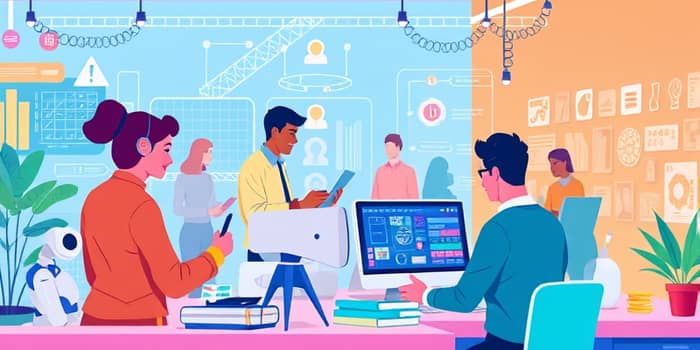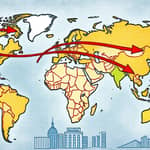
The dawn of a new era in the world of work is upon us. AI and automation are not just trends—they are catalysts for profound transformational change across industries. As machines become capable of handling routine tasks, humans are freed to pursue higher-value activities that require creativity, empathy, and critical thinking. However, this shift also brings challenges in displacement, reskilling, and ethical considerations that demand proactive strategies from individuals, organizations, and policymakers alike.
The data on job displacement and creation underscores a complex reality. By 2030, experts estimate up to 300 million jobs could be affected by AI-driven automation worldwide, with advanced economies facing the highest exposure. Yet, the narrative is not purely one of loss. Predictions point to a net gain of 78 million new roles globally, as emerging sectors and technologies give rise to fresh opportunities.
Moreover, these shifts could drive productivity gains of 7% globally, boosting economic output and creating room for new ventures. While nearly half of current tasks could see automation, only around 5% of roles are vulnerable to complete machine takeover. This blend of human and artificial intelligence will define the workforce of tomorrow.
Advancements in robotics, large language models, and generative AI are at the forefront of this transformation. Industries as varied as manufacturing, retail, and healthcare have already begun integrating intelligent systems to streamline operations and enhance outcomes.
Case studies illuminate both opportunities and pitfalls. A leading retailer reported a 65% automation potential in cashier roles by 2025, yet also saw a 20% increase in customer satisfaction after reallocating employees to advisory positions. Meanwhile, a global logistics firm credits AI-driven routing systems with a 15% rise in delivery efficiency, demonstrating that human oversight remains vital to interpreting and acting upon machine-generated insights.
As roles evolve, the workforce must adapt through continuous learning. Approximately 14% of workers may migrate to new careers by 2030, emphasizing the importance of lifetime learning and adaptability in professional development. Educational institutions and corporate training programs are expanding offerings in digital literacy and creative problem-solving to meet this demand.
Experts identify key competencies that will underpin future employability:
By investing in these areas, individuals can position themselves at the forefront of emerging roles—from prompt engineering to AI ethics oversight—ensuring they remain indispensable partners in human-machine collaborations.
Governments and businesses play a pivotal role in shaping an inclusive transition. Debates around universal basic income, social safety nets, and regulation of AI technologies are intensifying as societies grapple with widening inequalities and the pace of change. Establishing frameworks for enhanced work-life balance and ethical AI deployment is essential for sustainable progress.
Organizations are already rethinking job design and workforce strategies. Hybrid teams composed of human experts and AI systems are becoming commonplace, redefining operational models and corporate cultures. Some leading firms report that shifting menial tasks to automation has led to a 30% increase in employee engagement and a 12% boost in retention rates.
Policy initiatives also support training and mobility by offering tax incentives for companies that invest in reskilling programs, and by subsidizing access to online courses in high-demand fields. These measures aim to bridge the gap between displaced workers and emerging opportunities, ensuring broad participation in the digital economy.
The future of work will hinge on our collective ability to balance innovation with equity. While some roles will inevitably disappear, countless others will emerge—often in places and industries we cannot yet fully envision. By embracing creative and strategic tasks and fostering a culture of continuous learning, workers and organizations alike can harness the full potential of AI-driven transformation.
Ultimately, the partnership between humans and machines promises to deliver a new paradigm in which productivity soars, job satisfaction deepens, and societal challenges are addressed with unprecedented speed and scale. As we step into this brave new world, proactive collaboration across sectors will ensure that the benefits of automation and AI are shared widely and ethically.
Standing at the crossroads of possibility and disruption, we are called upon to chart a path that leverages technology for human flourishing. By prioritizing upskilling, ethical governance, and inclusive policies, we can shape a future of work that reflects our highest aspirations and values.
References













